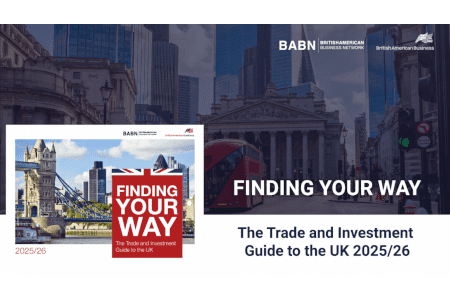Louis Taylor, Chief Executive Officer, UK Export Finance (UKEF), outlines how the department is supporting the government’s vision for a Global Britain by helping SMEs across the UK grow through export.
Why is export vital to the UK economy?
The Industrial Strategy provides a platform for international success. One of the Prime Minister’s first priorities was to develop a modern Industrial Strategy to help unlock the potential of UK businesses, creating better, higher-paying jobs. There is a world of opportunity for UK exporters. The global economy is changing fast. Despite the impacts of the global financial crisis in 2008, global exports were worth around two times more in 2017 than in 1997 in real terms[1].
Businesses that export are more productive, create more jobs and pay higher wages[2] and Britain’s success in this area is tried and tested. UK businesses have an international reputation for high-quality, desirable products and services. Our export success spans all sectors and regions of the country, from aerospace in Northern Ireland to transport in Wales, energy in Scotland and financial services in England.
Trade with the UK provides great support for developing countries, helping boost economies and simultaneously creating future trade partners. The government’s ambition is to strengthen the UK’s existing position as one of the 21st century’s great trading nations.
In support of the Industrial Strategy, the UK Government’s Export Strategy sets a new ambition to transform Britain’s export performance, raising exports as a proportion of GDP from 30% to 35%[3]. It also sets out how we in government will support this: by inspiring, informing, connecting and financing businesses to succeed abroad.
How do UK exports compare with the rest of the world?
The UK is punching above its weight but below its potential.
The UK is well-placed to seize these export opportunities. According to the latest provisional data from the IMF in 2017[4] the UK ranked sixth largest exporter of goods and services in the world. This places it third in Europe, however, there is a lot more that can be done to achieve its full exporting potential.
As incomes in emerging markets continue to grow, this offers an opportunity for UK businesses to raise their ambition beyond established export markets. When we leave the EU, we will be able to pursue an independent trade policy to maximise opportunities around the world.
What role does UK Export Finance (UKEF) play in unleashing the UK’s export potential?
UKEF is the UK’s export credit agency and a government department, working alongside the Department for International Trade as an integral part of its strategy and operations.
UKEF’s mission is to ensure no viable UK export fails for lack of finance or insurance, helping companies win business, fulfil contracts and get paid. It works with private credit insurers and lenders to help UK companies access export finance (the particular class of loans, insurance policies or bank guarantees that enable international trade to take place as easily and securely as possible).
UKEF exists to complement, not compete with, the private sector and help UK companies in a number of ways, including helping secure export contracts by providing attractive financing terms to their buyers, supporting working capital loans so they can fulfil contracts, and ensuring they get paid by insuring against buyer default.
UKEF can support exports for any size of company and across all sectors, from capital goods to services and intangibles such as intellectual property.
General low levels of awareness around trade finance mean many companies can be unaware of this potential support. A targeted marketing campaign “Exporters Edge” under the “Exporting is GREAT” banner was created to address this and drive uptake across UK SMEs, banks, insurance brokers and other private sector and government networks.
How can UKEF help to give companies the exporter’s edge and make their products even more competitive?
Buyers generally balance price against quality and reliability to understand value. This means that when it comes to international business, it is not only a product that makes a company competitive, but also the financial arrangements.
The right finance or insurance, specifically export finance and insurance, can make all the difference – for example, giving UK businesses the ability to offer competitive payment terms, helping businesses to compete internationally.
Academic research shows that companies selling overseas that have access to trade finance have export volumes as much as 60% higher. Finance and insurance for exports can come from many sources, including high street banks, insurers, brokers, alternative finance providers, as well as UK Export Finance, the UK government’s export credit agency.
These institutions can offer a wide range of support for their customers; from working capital facilities, to contract bonds, to export insurance. This allows companies to offer attractive credit terms, provide assurances to their customers in the form of performance and warranty bonds and protect themselves against non-payment.
Export finance and insurance can give UK companies the exporting edge especially when paired with world-beating quality of UK products and services.
What is in store for 2019?
As the UK prepares to leave the EU, UKEF has been front and centre of the UK Government’s measures to grow trading relationships around the world. It has already put in place measures to support UK exporters through Brexit and beyond, as well as helping them to make the most of new trading relationships by significantly increasing capacity to support trade with over 100 markets.
This is already having an impact. Since our business plan for 2017 – 2020 was launched, UKEF has supported landmark projects all over the world including the UAE, Mexico and Ghana. It has also continued its commitment to helping the government of Iraq with post-conflict infrastructure and supported other construction projects in Oman and Uganda. UKEF’s support of post–conflict infrastructure has extended to the development of vital healthcare services, with a €380 million loan to support the construction of three hospitals in Angola.
UKEF has also introduced a partnership with five major UK banks to streamline the process for providing government backed trade finance support to businesses. This partnership increases the speed and convenience with which SMEs (including exporters’ suppliers) can access UKEF’s trade finance schemes. UKEF has also expanded its local financing scheme to allow support in 62 currencies, from the Panamanian balboa to the Polish zloty, meaning more overseas buyers of UK exporters can “buy British, pay local”.
Entering 2019, the focus firmly remains on growth and raising awareness. Through this continued drive and ongoing collaboration with the financial services sector, UKEF will continue to support UK businesses by giving them the exporters edge that will help them thrive.
[1] United Nations Conference on Trade Development (UNCTAD).
[2] 1 BIS (2011), International trade and investment: the economic rationale for government intervention.
[3] 2 ONS (2018), Quarterly National Accounts, January to March, released 29.06.18
[4] IMFBoPData(2017)





